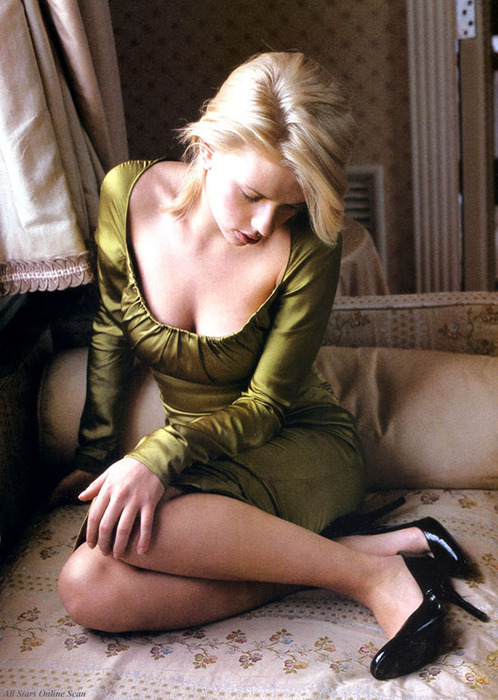Seeing a Hollywood icon like Scarlett Johansson nonchalantly walking past a Primark store gives a feeling of unity. Despite her accolades as Esquire’s “Sexiest Woman Alive”, a favorite of Woody Allen, and a Bafta award-winner, she effortlessly blends in with the crowd while filming her latest movie in everyday attire on the busy streets of Glasgow. Even when stripped of her Hollywood glamour and luxurious lifestyle in Bel Air, Scarlett Johansson still maintains her individuality. This uniqueness is not just because of her role in the low-budget sci-fi film “Under the Skin”, but simply because she is, well, herself. As we see her navigating the streets of Glasgow, there is a surreal mix of worlds. Scenes show Scarlett Johansson taking public transport, asking for directions, and relaxing in a modest home, all while remaining true to her identity.

Observing a famous Hollywood star amidst the everyday residents of a working-class neighborhood in Scotland feels almost otherworldly. While celebrities may not be a different breed entirely, the stark contrast of seeing someone renowned for glamorous red-carpet appearances blending in with regular folks on a humble street is surreal. When I crossed paths with Scarlett Johansson, aged 29, she epitomized Hollywood elegance. Clad in chic clothing and towering heels, her flawless look was enhanced by expertly done makeup and hair. Surrounded by assistants and PR personnel, she exuded an air of extraordinary presence. At a recent press conference, Johansson’s enthusiastic praise for director Jonathan Glazer indicated her belief in the film’s thought-provoking and engaging qualities, which diverged from the usual surface-level inquiries she faces. Despite minimal dialogue, the enigmatic portrayal of her character as an emotionless alien in the film likely intrigued her, particularly given the challenging filming conditions in Scotland. It’s apparent that Johansson was attracted to the project for reasons beyond just the script, as the film’s unique narrative and unconventional approach must have resonated with her artistic inclinations. The controversial scenes featuring her character have fueled intense discussions among her loyal fan base.

Why did she decide to accept this particular script over the others she received? Well, word had it that Jonathan was working on a movie with a completely different plot originally. When she met him, it was evident that he was struggling to grasp his connection to the project. It wasn’t his passion project, but there was something about the idea of playing an alien character that piqued their interests. The notion of embodying a character devoid of judgment, completely observant, presented a stimulating challenge for her. At this stage of her career, she finds it more captivating to delve into roles that she knows she can portray but is uncertain about how to do it. She relishes the unpredictability and the chance to explore new depths in her performances rather than just taking on roles she knows she can handle easily. Throughout the years, she collaborated closely with Glazer, a renowned director recognized for his work on famous advertisements and films such as “Sexy Beast” and “Birth.” She became heavily invested in the project, even as the storyline and script underwent changes. Interestingly, the dialogue delivered in an English accent was predominantly improvised, adding to the unique and challenging experience of bringing her character to life on screen.

It was definitely a daring move, no doubt about that. Unlike mainstream blockbusters such as Captain America, where the lead actress donned a catsuit and raked in millions, Glazer is not exactly a household name. The critics’ reviews are all over the map. Some are praising the film as a “bizarre and extraordinary masterpiece,” while others are dismissing it as a “ridiculously bad sci-fi flick.” At the premiere of the film at the Venice film festival, there was a mix of applause and jeers that left the actress feeling vulnerable and somewhat surprised. When asked about the experience, she described it as very surreal. It was her first time watching the film with an audience and seeing the final product. The mixed feedback left her unsure of how to react. While she was caught off guard, the director was thrilled by the reaction. The contrasting responses left her feeling perplexed, but the director viewed it as a fantastic outcome. It’s fair to say that the reviews for the film are deeply divided.

I believe in having strong, unwavering opinions rather than settling for mediocrity. When I first watched “Eyes Wide Shut,” I loathed it so much that I had to watch it again to figure out why. Surprisingly, I ended up falling in love with the film due to the intense emotions it provoked. Even if a movie stirs up negative emotions, there is still value in the passion it incites. What intrigued me about “Under the Skin” was that many of the actors were non-professionals cast off the street, lending a raw authenticity to the film. Initially hesitant, Scarlett Johansson eventually embraced this unconventional casting choice. The movie can be seen as a symbolic representation of the relationship between celebrities and ordinary people, portraying the dynamics of fame. Johansson’s character feeds off unsuspecting individuals, reflecting the predatory nature of celebrity culture. Yet, the film also delves into the struggles and loneliness that celebrities face in their public interactions. As the story unfolds, the roles of predator and prey are reversed, prompting viewers to rethink their perceptions.

Glazer makes a deliberate choice in his film casting decisions, opting for a Hollywood star in disguise rather than an unknown actor to create a surreal effect when placed in real-world settings. Scarlett Johansson’s role in his film is a departure from her typical commercial movies, showcasing her versatility as an actress. While her character’s alien traits feel somewhat familiar due to her past roles, her performance in Spike Jonze’s “Her” demonstrates her ability to create a nuanced and fully-realized character through voice alone, showcasing her talent beyond her physical appearance. Critics have praised her for this complex portrayal, proving she is more than just a seductive figure for male audiences. Johansson’s breakout role in “Lost in Translation” highlighted her skill in embodying a young, captivating woman forming a connection with an older man, a theme she has continued in films like “Girl With a Pearl Earring” and various Woody Allen projects. Allen himself has praised Johansson’s acting abilities and strong presence, while she has reciprocated by showing admiration for him and a willingness to support him in any way possible.

Recently, Dylan Farrow, who has a strained relationship with Woody Allen, penned an open letter accusing him of mistreating her and called out the film industry for not addressing the issue. She specifically called out actors like Scarlett Johansson who have worked with Allen in the past. When Johansson was asked about being mentioned in the letter, she admitted feeling uneasy and stated that it was not fair to involve actors who may not have all the information. Johansson also mentioned that she was not aware of the backlash against Allen and emphasized that he has not been charged with any crimes. She added that she is not in a position to judge their relationship or her own feelings towards him based solely on the accusations.

She looks flustered, and as the publicist signals for me to move on, I bring up a more challenging topic: SodaStream. When I type “Scarlett Johansson” into Google, the fizzy drink company appears as the third search suggestion, beating out “Scarlett Johansson Hot” and “Scarlett Johansson bum.” Johansson found herself at the center of a media frenzy when it came to light that Oxfam had contacted her regarding her role as a brand ambassador for SodaStream. The company operates a factory in a settlement on the West Bank, causing concern for Oxfam due to its impact on Palestinian communities. Johansson decided to step down from her position at Oxfam, sparking theories that she had not received proper advice and had not thoroughly researched the situation before accepting the role, unintentionally getting involved in a complex geopolitical conflict. Despite the controversy, Johansson stands by her decision, stating that she knew about the factory’s location before accepting the role and believes that shutting it down would harm the workers employed there. She acknowledges that the settlements are considered illegal by the international community, but argues that this is a topic up for debate. Johansson admits that this situation has placed her in a broader conversation without a clear right or wrong perspective.

However, there is a general consensus among various international bodies such as the UN Security Council, UN General Assembly, International Committee of the Red Cross, and International Court of Justice that the settlements in the West Bank are a violation of international law. It is noteworthy that despite her personal ties to the Jewish community, Johansson stands firm in her beliefs. Some may criticize her stance as naive or influenced by poor advice, as navigating such a complicated conflict is challenging. The controversy surrounding Johansson’s involvement with both Oxfam, a charity focused on poverty alleviation, and a commercial product raises concerns about ethics and conflicting interests. While some see her decision as a trade-off between charity and financial gain, Johansson argues that NGOs like Oxfam should not support political causes. The interviewer discusses these issues with Johansson before the conversation abruptly ends, leaving the topic of “Under the Skin” unresolved. This interaction symbolizes the intricate relationship between celebrities and the public, illustrating the power dynamics at play. To emphasize this disconnect, a masked figure seen in the film escorts the interviewer out as the interview comes to a close.


